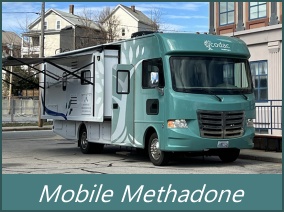 Providence, Rhode Island is the first location in the United States to offer a mobile methadone service. This article profiles CODAC Behavioral Health who operate a 27 foot RV that has been modified to function as a mobile methadone unit.
Providence, Rhode Island is the first location in the United States to offer a mobile methadone service. This article profiles CODAC Behavioral Health who operate a 27 foot RV that has been modified to function as a mobile methadone unit.
The concept behind this innovative approach is to bring essential medication-assisted treatment services to the rural areas of Rhode Island where many prospective patients are underserved.
Access to methadone and buprenorphine-based treatments remains an ongoing challenge as nearly 83% of those with opioid use disorder (OUD) are not yet utilizing medication to help with their opioid withdrawal symptoms. Opioid withdrawal sickness is the primary driver of illicit opioid use, opioid overdose, and lifestyle disruption.
CODAC received their FDA approval in July 2022 to begin dispensing methadone from their mobile unit.
Methadone clinics are a lifesaver for many thousands of recovering individuals across the country. There are a number of new clinics opening each week, but the provision of a methadone mobile service offers an interesting alternative that will be closely watched and evaluated in the years ahead.

 Follow
Follow


 There are plenty of illegally manufactured medications of unknown origin currently flooding the country. In addition to heroin, methamphetamines, and other highly addictive substances, common prescriptions for managing psychiatric disorders are now accessible on the street as well.
There are plenty of illegally manufactured medications of unknown origin currently flooding the country. In addition to heroin, methamphetamines, and other highly addictive substances, common prescriptions for managing psychiatric disorders are now accessible on the street as well. A
A  The faces of recovery are as diverse as you can imagine. Decades ago, there were common stereotypes of addicts as people who looked a certain way and likely came from a shady side of the tracks.
The faces of recovery are as diverse as you can imagine. Decades ago, there were common stereotypes of addicts as people who looked a certain way and likely came from a shady side of the tracks.


